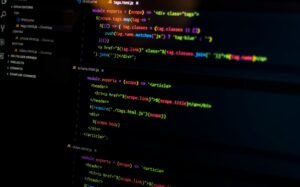Top AI Books to Read
Artificial Intelligence (AI) is evolving rapidly and has become a significant field impacting various industries. To stay updated with the latest advancements and gain a deeper understanding of AI, reading books is an excellent way to expand your knowledge. In this article, we have compiled a list of the top AI books to help you explore the fascinating world of AI.
Key Takeaways
- Discover the best AI books to broaden your understanding.
- Stay updated with the latest AI advancements.
- Explore various AI applications across different industries.
1. “Artificial Intelligence: A Modern Approach” by Stuart Russell and Peter Norvig
This comprehensive textbook covers various aspects of AI, including intelligent agents, problem-solving, knowledge representation, machine learning, and more. *AI is revolutionizing industries worldwide and this book provides a solid foundation for understanding its underlying principles.*
2. “Deep Learning” by Ian Goodfellow, Yoshua Bengio, and Aaron Courville
Deep learning is a subfield of AI that focuses on artificial neural networks and their applications. This book provides a comprehensive introduction to deep learning techniques, architectures, and algorithms. *With the rise of deep learning, understanding how neural networks work is crucial for unlocking AI’s potential.*
3. “Machine Learning Yearning” by Andrew Ng
This practical book by Andrew Ng, a prominent figure in the AI community, offers insights, tips, and best practices for building and deploying machine learning systems. *Andrew Ng‘s expertise and real-life examples make this book an invaluable resource for anyone interested in practical AI applications.*
Tables
| Book | Author(s) |
|---|---|
| “Artificial Intelligence: A Modern Approach” | Stuart Russell, Peter Norvig |
| “Deep Learning” | Ian Goodfellow, Yoshua Bengio, Aaron Courville |
| “Machine Learning Yearning” | Andrew Ng |
| Book | Topics Covered |
|---|---|
| “Artificial Intelligence: A Modern Approach” | Intelligent agents, problem-solving, knowledge representation, machine learning, and more |
| “Deep Learning” | Deep learning techniques, architectures, and algorithms |
| “Machine Learning Yearning” | Machine learning system building and deployment |
| Book | Author(s) |
|---|---|
| “Artificial Intelligence: A Modern Approach” | Stuart Russell, Peter Norvig |
| “Deep Learning” | Ian Goodfellow, Yoshua Bengio, Aaron Courville |
| “Machine Learning Yearning” | Andrew Ng |
4. “Superintelligence: Paths, Dangers, Strategies” by Nick Bostrom
This thought-provoking book delves into the potential societal impacts and risks associated with artificial superintelligence. *Nick Bostrom examines the possible paths and strategies humanity must consider to navigate the future of AI responsibly.*
5. “The Hundred-Page Machine Learning Book” by Andriy Burkov
As the title suggests, this concise book compresses the key concepts and techniques of machine learning into a hundred pages, making it an accessible resource for beginners. *Andriy Burkov offers a compact yet comprehensive guide to grasp the essentials of machine learning.*
6. “Human Compatible: Artificial Intelligence and the Problem of Control” by Stuart Russell
Stuart Russell, a renowned AI researcher, explores the crucial issue of aligning AI’s goals with human values, emphasizing the importance of controlling AI systems. *This book delves into one of AI’s fundamental challenges, ensuring that AI is compatible with human values and interests.*
7. “Pattern Recognition and Machine Learning” by Christopher M. Bishop
This comprehensive textbook covers the foundations of pattern recognition and machine learning algorithms, making it an invaluable resource for anyone interested in diving into this field. *Christopher M. Bishop provides a rigorous yet accessible guide to understanding the algorithms that underpin AI.*
8. “The Book of Why: The New Science of Cause and Effect” by Judea Pearl and Dana Mackenzie
This book explores the concept of causality and how it intersects with AI and machine learning. *Judea Pearl, a pioneer in causality research, offers a powerful framework to understand and model cause-and-effect relationships in AI systems.*
Conclusion
In conclusion, these top AI books provide a wealth of knowledge and insights into the exciting field of artificial intelligence. Whether you are a beginner or an experienced practitioner, these books will help you deepen your understanding and stay up-to-date with the latest advancements.

Common Misconceptions
Misconception 1: AI Books are only for technical experts
One common misconception about AI books is that they are only meant for technical experts or those with a deep understanding of programming and algorithms. However, many AI books are written in a way that is accessible to a wider audience, including beginners and non-technical readers.
- AI books often include introductory chapters that provide a foundation for understanding the concepts.
- Authors use relatable examples and analogies to explain complex AI concepts.
- Some AI books are written specifically for business professionals or individuals outside the technology industry.
Misconception 2: AI books only focus on futuristic scenarios
Another misconception is that AI books solely focus on futuristic scenarios or hypothetical situations. While some AI books explore the future implications of artificial intelligence, many also delve into the current applications and impact of AI in various industries.
- AI books discuss practical use cases and real-world examples of AI technologies.
- Authors explain the ethical and social implications of AI and its effects on employment, healthcare, and education.
- Some AI books provide historical context and trace the development of AI from its origins to the present day.
Misconception 3: AI books are overly technical and lack practical application
A common misconception about AI books is that they are overly technical and lack practical application. However, many AI books provide a balance between technical details and practical implementation strategies.
- AI books offer practical guidance on how to implement AI technologies in various industries.
- Authors provide case studies and real-world examples of successful AI projects.
- Some AI books include code snippets, algorithms, and frameworks for readers interested in the technical aspects.
Misconception 4: AI books are only for those pursuing a career in AI
There is a misconception that AI books are only relevant to those pursuing a career in AI or data science. However, AI books are valuable for anyone seeking a better understanding of artificial intelligence, its implications, and its potential impact on society.
- AI books help individuals become informed consumers of AI products and technologies.
- They offer insights into how AI is transforming industries and shaping the future.
- AI books can be beneficial for policymakers, educators, and professionals in various fields who want to stay updated on AI advancements.
Misconception 5: AI books are all the same
One common misconception is that all AI books are the same, covering similar topics and perspectives. However, AI is a rapidly evolving field, and AI books touch upon a wide range of subtopics, perspectives, and techniques.
- AI books cover different areas of AI, such as machine learning, natural language processing, computer vision, and robotics.
- Authors have varying expertise and offer unique insights into different aspects of AI.
- Some AI books focus on the ethics and societal impact of AI, while others emphasize technical knowledge and implementation.

AI Books by Author
Here are some top AI books categorized by their respective authors. These books cover a range of topics related to artificial intelligence, including machine learning, robotics, and ethics.
| Title | Author | Publication Year |
|---|---|---|
| The Master Algorithm | Pedro Domingos | 2015 |
| Sapiens: A Brief History of Humankind | Yuval Noah Harari | 2014 |
| The Singularity Is Near | Ray Kurzweil | 2005 |
| Homo Deus: A Brief History of Tomorrow | Yuval Noah Harari | 2015 |
| Superintelligence: Paths, Dangers, Strategies | Nick Bostrom | 2014 |
AI Books by Topic
Explore AI books dedicated to specific topics within the field. These books provide in-depth knowledge and insights into various aspects of artificial intelligence.
| Title | Author | Topic |
|---|---|---|
| Deep Learning | Yoshua Bengio, Ian Goodfellow, Aaron Courville | Machine Learning |
| Artificial Intelligence: A Modern Approach | Stuart Russell, Peter Norvig | General AI |
| The Emotion Machine | Marvin Minsky | Cognitive Science |
| Robotics: Modelling, Planning, and Control | Bruno Siciliano, Lorenzo Sciavicco, Luigi Villani, Giuseppe Oriolo | Robotics |
| Data Science for Business | Foster Provost, Tom Fawcett | Data Science |
AI Books by Popularity
Discover the most popular AI books that have captivated many readers around the world. These books have gained immense popularity for their engaging writing style and informative content.
| Title | Author | Average Rating (out of 5) |
|---|---|---|
| The Innovators: How a Group of Hackers, Geniuses, and Geeks Created the Digital Revolution | Walter Isaacson | 4.2 |
| Weapons of Math Destruction | Cathy O’Neil | 4.0 |
| Life 3.0: Being Human in the Age of Artificial Intelligence | Max Tegmark | 4.3 |
| Thinking, Fast and Slow | Daniel Kahneman | 4.5 |
| The Big Nine: How the Tech Titans and Their Thinking Machines Could Warp Humanity | Amy Webb | 4.1 |
AI Books for Beginners
If you’re new to AI or looking for books that provide a gentle introduction to the subject, these AI books for beginners are a great place to start. They explain complex concepts in a beginner-friendly manner.
| Title | Author | Difficulty Level |
|---|---|---|
| The Hundred-Page Machine Learning Book | Andriy Burkov | Easy |
| Artificial Intelligence Basics | Nikolaos Bourbakis | Easy |
| The AI Book: The Artificial Intelligence Handbook for Investors, Entrepreneurs and Fintech Visionaries | Dr. Aritra Ghosh | Easy |
| Machine Learning for Dummies | John Paul Mueller, Luca Massaron | Easy |
| AI Superpowers: China, Silicon Valley, and the New World Order | Kai-Fu Lee | Easy |
AI Books for Advanced Readers
For those well-versed in the field of AI and seeking advanced knowledge, these books delve into complex AI concepts and theory, perfect for readers looking for intellectual challenges.
| Title | Author | Advanced Topics Covered |
|---|---|---|
| Reinforcement Learning: An Introduction | Richard S. Sutton, Andrew G. Barto | Deep Reinforcement Learning |
| Pattern Recognition and Machine Learning | Christopher M. Bishop | Statistical Pattern Recognition |
| The Elements of Statistical Learning | Trevor Hastie, Robert Tibshirani, Jerome Friedman | Statistical Learning Theory |
| Probabilistic Graphical Models: Principles and Techniques | Daphne Koller, Nir Friedman | Probabilistic Graphical Models |
| Bayesian Reasoning and Machine Learning | David Barber | Bayesian Inference |
Award-Winning AI Books
Recognized for their exceptional contributions to the field, these award-winning AI books have received prestigious awards and accolades from esteemed organizations.
| Title | Author | Award |
|---|---|---|
| The Age of Intelligent Machines | Ray Kurzweil | Computer Science and Engineering Book of the Year Award (1987) |
| Affective Computing | Rosalind W. Picard | Association of American Publishers Professional/Scholarly Publishing Division PROSE Award for Computing and Information Sciences (2000) |
| The Most Human Human | Brian Christian | National Book Critics Circle Award Finalist for General Nonfiction (2011) |
| Machine Learning: A Probabilistic Perspective | Kevin P. Murphy | Victor Lesser IJCAI Outstanding Paper Award (2013) |
| Thinking Machines: The Inside Story of Artificial Intelligence and Our Race to Build the Future | Luke Dormehl | Financial Times Business Book of the Month (2017) |
AI Books with Strong Ethical Focus
Delving into the ethical implications of AI and its impact on society, these books offer critical insights on the intersection of artificial intelligence and ethics.
| Title | Author | Ethical Themes Explored |
|---|---|---|
| We, Robots: Staying Human in the Age of Big Data | Curtis White | Data Privacy, Algorithmic Bias |
| Weapons of Math Destruction | Cathy O’Neil | Algorithmic Injustice, Fairness, Accountability |
| The Alignment Problem: Machine Learning and Human Values | Brian Christian | Machine Ethics, Human-AI Collaboration |
| Robot Ethics: The Ethical and Social Implications of Robotics | Patrick Lin, Keith Abney, George Bekey | Robot Ethics, Responsibility, Governance |
| Artificial Unintelligence: How Computers Misunderstand the World | Meredith Broussard | AI Bias, Gender and Racial Discrimination |
Notable AI Biographies
Discover the fascinating stories behind the pioneers and influential figures in the field of artificial intelligence through these engaging biographies.
| Title | Author | Subject |
|---|---|---|
| Alan Turing: The Enigma | Andrew Hodges | Alan Turing |
| The Man Who Knew Too Much: Alan Turing and the Invention of the Computer | David Leavitt | Alan Turing |
| Genius: The Life and Science of Richard Feynman | James Gleick | Richard Feynman |
| Elon Musk: Tesla, SpaceX, and the Quest for a Fantastic Future | Ashlee Vance | Elon Musk |
| Steve Jobs | Walter Isaacson | Steve Jobs |
Artificial intelligence has become a captivating field, merging technology and innovation with numerous ethical and societal considerations. These tables showcase an array of AI books categorized by author, topic, popularity, difficulty level, awards, ethical focus, and biographies. Whether you are a beginner searching for an accessible introduction or an advanced reader eager to explore complex theories, these books offer diverse perspectives and insightful narratives. Immerse yourself in the fascinating world of AI as you delve into these recommended reads, each providing unique contributions to your understanding of artificial intelligence.
Frequently Asked Questions
What are some popular AI books for beginners?
Some popular AI books for beginners include “Artificial Intelligence: A Modern Approach” by Stuart Russell and Peter Norvig, “The Hundred-Page Machine Learning Book” by Andriy Burkov, and “Deep Learning” by Ian Goodfellow, Yoshua Bengio, and Aaron Courville.
Which books cover advanced concepts in AI?
Books that cover advanced concepts in AI include “Deep Learning with Python” by François Chollet, “Reinforcement Learning: An Introduction” by Richard S. Sutton and Andrew G. Barto, and “Pattern Recognition and Machine Learning” by Christopher M. Bishop.
Can you recommend any AI books for specific industries?
Certain AI books cater to specific industries. For example, “AI Superpowers: China, Silicon Valley, and the New World Order” by Kai-Fu Lee focuses on AI’s impact on China and the U.S., while “Machine Learning for Dummies” by John Paul Mueller and Luca Massaron covers AI in a general business context.
What are some must-read AI books for data scientists?
Must-read AI books for data scientists include “Hands-On Machine Learning with Scikit-Learn, Keras, and TensorFlow” by Aurélien Géron, “Python for Data Analysis” by Wes McKinney, and “The Elements of Statistical Learning” by Trevor Hastie, Robert Tibshirani, and Jerome Friedman.
Are there any AI books that discuss ethical considerations?
Yes, several AI books address the ethical aspects of artificial intelligence. Some notable titles are “Weapons of Math Destruction” by Cathy O’Neil, “Robot Ethics: The Ethical and Social Implications of Robotics” by Patrick Lin et al., and “The Big Nine: How the Tech Titans and Their Thinking Machines Could Warp Humanity” by Amy Webb.
Which AI books focus on natural language processing (NLP)?
Books that specifically focus on natural language processing (NLP) include “Speech and Language Processing” by Daniel Jurafsky and James H. Martin, “Natural Language Processing with Python” by Steven Bird, Ewan Klein, and Edward Loper, and “Deep Learning for Natural Language Processing” by Palash Goyal and Sumit Pandey.
What are some AI books that explore the future implications of AI?
AI books that discuss the future implications of artificial intelligence include “Superintelligence: Paths, Dangers, Strategies” by Nick Bostrom, “AI Superpowers: China, Silicon Valley, and the New World Order” by Kai-Fu Lee, and “The Singularity Is Near: When Humans Transcend Biology” by Ray Kurzweil.
Can you recommend any AI books for understanding neural networks?
Books that provide a comprehensive understanding of neural networks include “Neural Networks and Deep Learning” by Michael Nielsen, “Deep Learning” by Ian Goodfellow, Yoshua Bengio, and Aaron Courville, and “Make Your Own Neural Network” by Tariq Rashid.
Are there any AI books that cover computer vision?
Yes, there are AI books that cover computer vision. Some notable titles in this area include “Computer Vision: Models, Learning, and Inference” by Simon J. D. Prince, “Learning OpenCV 4 Computer Vision with Python 3” by Joseph Howse, and “Deep Learning for Vision Systems” by Mohamed Elgendy.
Which AI books focus on the intersection of AI and robotics?
Books that focus on the intersection of AI and robotics include “Probabilistic Robotics” by Sebastian Thrun, Wolfram Burgard, and Dieter Fox, “Robotics, Vision and Control: Fundamental Algorithms in MATLAB” by Peter Corke, and “Robotics: Modelling, Planning and Control” by Bruno Siciliano and Lorenzo Sciavicco.




